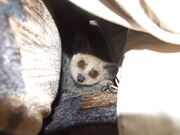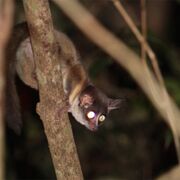Biology:Eastern dwarf galago
| Paragalago | |
|---|---|
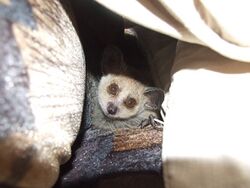
| |
| Juvenile Grant's bushbaby (P. granti) | |
| Scientific classification | |
| Domain: | Eukaryota |
| Kingdom: | Animalia |
| Phylum: | Chordata |
| Class: | Mammalia |
| Order: | Primates |
| Suborder: | Strepsirrhini |
| Family: | Galagidae |
| Genus: | Paragalago Masters et al., 2017 |
| Type species | |
| Galago zanzibaricus Matschie, 1893
| |
| Species | |
|
Paragalago cocos | |
The eastern dwarf galagos are a group of five species of strepsirrhine primates of the family Galagidae, native to East Africa. They were formerly classified in the genus Galagoides but have been moved to their own genus, Paragalago, based on genetic evidence, and supported by differences in vocalizations and morphology.[1] The three western/Congolian species remain in Galagoides.
The two genera are not sister taxa and thus apparently evolved their small sizes and some morphological similarities via parallel evolution, although members of the eastern group tend to be larger. They are separated by the East African Rift. Paragalago is actually sister to the genus of 'lesser galagos', Galago, which are similar in size.[1] There is limited sympatry between Paragalago and the much more widely distributed Galago. Paragalago members range in mass from 60 to 250 g, considered small to medium-sized among galagids.[1]
All five species have been evaluated by the IUCN. P. orinus is considered to be vulnerable, P. rondoensis to be endangered, P. zanzibaricus is listed as near threatened, while P. cocos and P. granti are of least concern.
The Taita mountain dwarf galago, found in the Taita Hills, is unclassified.[2] Based on vocalizations, it may be the Kenya coast galago. These dwarf galagos are present in very small forest fragments and are in immediate danger of extinction.
Paragalago species
| Common name | Scientific name and subspecies | Range | Size and ecology | IUCN status and estimated population |
|---|---|---|---|---|
| Grant's bushbaby | P. granti (Thomas & Wroughton, 1907) |
Southeastern Africa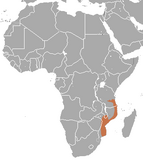
|
Size: 14–19 cm (6–7 in) long, plus 20–27 cm (8–11 in) tail[3] Habitat: Forest[4] Diet: Invertebrates, fruit, gum, and flowers, as well as small birds[4] |
LC
|
| Kenya coast galago | P. cocos Heller, 1912 |
Southeastern Africa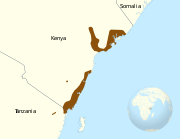
|
Size: 14–19 cm (6–7 in) long, plus 18–23 cm (7–9 in) tail[3] Habitat: Forest[5] Diet: Insects and fruit[6] |
LC
|
| Rondo dwarf galago | P. rondoensis Honess, 1997 |
Scattered Tanzania in southeastern Africa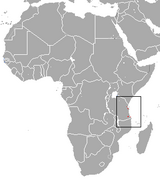
|
Size: 10–13 cm (4–5 in) long, plus 17–18 cm (7 in) tail[6] Habitat: Forest[7] Diet: Insects, as well as fruit and gum[6] |
EN
|
| Uluguru bushbaby | P. orinus Lawrence & Washburn, 1936 |
Southeastern Africa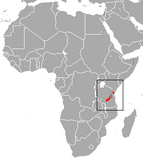
|
Size: 12–14 cm (5–6 in) long, plus 16–20 cm (6–8 in) tail[3] Habitat: Forest[8] Diet: Gum, nectar, invertebrates, and small vertebrates[3] |
VU
|
| Zanzibar bushbaby | P. zanzibaricus (Matschie, 1893) Two subspecies
|
Scattered Tanzania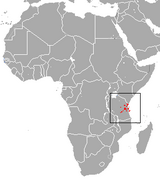
|
Size: 14–15 cm (6–6 in) long, plus 12–15 cm (5–6 in) tail[9] Habitat: Forest[10] Diet: Fruit, insects, and gum[9] |
NT
|
References
- ↑ 1.0 1.1 1.2 Masters, J.C.; Génin, F.; Couette, S.; Groves, C.P.; Nash, S.D.; Delpero, M.; Pozzi, L. (2017). "A new genus for the eastern dwarf galagos (Primates: Galagidae)". Zoological Journal of the Linnean Society 181 (1): 229–241. doi:10.1093/zoolinnean/zlw028.
- ↑ Rosti, H.; Rikkinen, J.; Pellikka, P.; Bearder, S.; Mwamodenyi, J.M. (2020). "Taita Mountain dwarf galago is extant in the Taita Hills of Kenya". Oryx 54 (2): 152–153. doi:10.1017/S003060531900142X.
- ↑ 3.0 3.1 3.2 3.3 Kingdon, ch. Galagos
- ↑ 4.0 4.1 4.2 de Jong, Y. A.; Butynski, T. M.; Perkin, A. (2019). "Paragalago granti". IUCN Red List of Threatened Species 2019: e.T91970347A17962454. doi:10.2305/IUCN.UK.2019-3.RLTS.T91970347A17962454.en. https://www.iucnredlist.org/species/91970347/17962454.
- ↑ 5.0 5.1 Butynski, T. M.; de Jong, Y. A. (2019). "Paragalago cocos". IUCN Red List of Threatened Species 2019: e.T136212A17963050. doi:10.2305/IUCN.UK.2019-3.RLTS.T136212A17963050.en. https://www.iucnredlist.org/species/136212/17963050.
- ↑ 6.0 6.1 6.2 Stuart; Stuart, ch. Galagos
- ↑ 7.0 7.1 Perkin, A. (2020). "Paragalago rondoensis". IUCN Red List of Threatened Species 2020: e.T40652A17962115. doi:10.2305/IUCN.UK.2020-2.RLTS.T40652A17962115.en. https://www.iucnredlist.org/species/40652/17962115.
- ↑ 8.0 8.1 Perkin, A. (2021). "Paragalago orinus". IUCN Red List of Threatened Species 2021: e.T40651A190242954. doi:10.2305/IUCN.UK.2021-1.RLTS.T40651A190242954.en. https://www.iucnredlist.org/species/40651/190242954.
- ↑ 9.0 9.1 Satovsky, Ryan (2006). "Galago zanzibaricus". University of Michigan. https://animaldiversity.org/accounts/Galago_zanzibaricus/.
- ↑ 10.0 10.1 Perkin, A.; Butynski, T. M.; de Jong, Y. A. (2020). "Paragalago zanzibaricus". IUCN Red List of Threatened Species 2020: e.T8790A179843811. doi:10.2305/IUCN.UK.2020-2.RLTS.T8790A179843811.en. https://www.iucnredlist.org/species/8790/179843811.
Sources
- Kingdon, Jonathan (2020). The Kingdon Pocket Guide to African Mammals (2nd ed.). Bloomsbury Publishing. ISBN 978-1-4729-8320-6.
- Stuart, Chris; Stuart, Mathilde (2017). Stuarts' Field Guide to the Larger Mammals of Africa (4th ed.). Penguin Random House South Africa. ISBN 978-1-77584-276-7.
External links
- More information about dwarf galagos of Taita Hills, Kenya on website animalstaita.com
- IUCN Red List assessments of Paragalagos
Wikidata ☰ Q31837388 entry
 |
